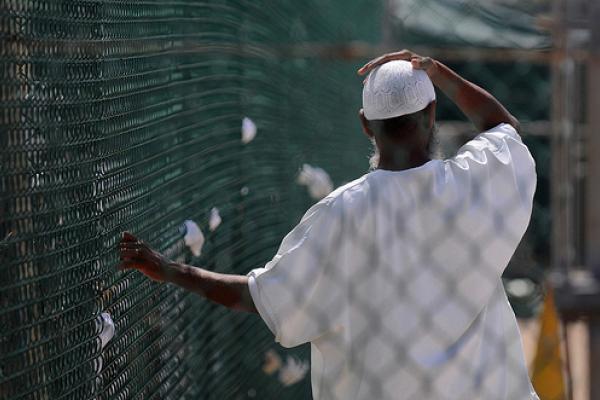In today’s White House press conference, CBS News' Bill Plante raised the questions with President Barack Obama about the growing hunger strike among prisoners at Guantanamo Bay. “Is it any surprise, really,” asked Plante, “that they would prefer death rather than have no end in sight to their confinement?"
"Well, it is not a surprise to me, “ President Obama responded, “that we've got problems in Guantanamo.”
Last week, a military spokesperson confirmed that the total number of irregularly held prisoners at the U.S. Naval prison at Guantanamo Bay has risen to 92 out of the 166 still in detention.
The Guantanamo prisoners began hunger striking on Feb. 6 after guards confiscated their Korans to examine them for contraband. The prisoners reported that their Korans had been desecrated by the guards, which a military spokesperson denies. Fueling the strike is the men’s loss of hope of ever leaving Guantanamo alive, most having been held more than 11 years without charge and Obama refusing to free even the 86 cleared for release.
In March, 51 attorneys representing detainees sent a letter first to the Commander of Guantanamo and then to Secretary of Defense Hagel expressing alarm about the health of their clients, saying nearly all 166 detainees were on hunger strike. In support, WAT organized a week-long solidarity fast — more than 100 people participated — and an ongoing campaign of vigils, daily calls to administration officials, and a rolling fast with someone fasting every day until the strike is over.
Initially the military denied the hunger strike. Officials now admit that 92 men are refusing to eat and 17 are being force-fed to keep them alive. Samir Naji al Hasan Moqbel, a prisoner at Guantanamo, stated:
“I will never forget the first time they passed the feeding tube up my nose. I can’t describe how painful it is to be force-fed this way. As it was thrust in, it made me feel like throwing up. I wanted to vomit, but I couldn’t. There was agony in my chest, throat and stomach. I had never experienced such pain before. I would not wish this cruel punishment upon anyone. I am still being force-fed. Two times a day they tie me to a chair in my cell. My arms, legs and head are strapped down.”
The U.S. policy of nonconsensual force-feeding is unethical and inhumane according to the U.N., the AMA, and human rights groups.
On April 22, 12 concerned U.S. citizens were arrested calling attention to the dire situation of the men at Guantanamo on the 75th day of a hunger strike. Wearing orange jump suits and black hoods, these members of Witness Against Torture staged a die-in on the steps of the Federal Courthouse in Manhattan.
Despite severe efforts by the military to break them, the detainees refuse to stop their hunger strike, the only form of protest they have. As peace activists, we still have other forms of redress and witness available to us, and we will not stop using them until our government adheres to its own rule of law, either charging and trying in civilian courts or releasing every man still at Guantanamo. The rest of the world sees through the outrageous justifications of the U.S. treatment of the men at Guantanamo.
Helen Schietinger, retired nurse living in Washington, D.C., is active in Witness Against Torture, a grassroots organization working to close Guantanamo, end torture and indefinite detention, and hold officials accountable for torture of prisoners in U.S. custody.
Photo: A detainee stands in an outdoor recreation yard at Joint Task Force Guantanamo’s Camp IV in 2010. by JTF Guantanamo / Flickr.com
Got something to say about what you're reading? We value your feedback!
